When it comes to pet care, hygiene is a vital aspect that many owners focus on. However, should this attention to cleanliness extend to bathing your rabbit? Can you give rabbits baths? This article dives into this topic, highlighting the best hygiene practices for your furry friends.

If you’ve ever wondered about the intricacies of bathing a rabbit, you’re not alone. Many rabbit owners find themselves pondering questions like, “Is it safe to bathe my rabbit?” or “How do I clean rabbit poop from its fur?”
Understanding the right methods and precautions can make a world of difference in maintaining your rabbit’s health and hygiene. In this article, we’ll answer these questions and more to ensure you have all the information you need.
The Rabbit’s Natural Cleaning Behavior
Rabbits are naturally clean animals, frequently grooming themselves much like cats do. They have a meticulous self-cleaning process that helps them maintain their cleanliness. This makes bathing them unnecessary in most cases, as they can effectively manage their hygiene themselves.
Read Also:
Can You Give Rabbits Baths?
Contrary to popular belief, it’s typically not advisable to give rabbits traditional baths. Rabbits have sensitive skin, and immersion in water can lead to shock, hypothermia, and even respiratory issues. They can become extremely stressed in water, which can adversely affect their health.
Spot Cleaning Your Rabbit
There might be instances where your rabbit gets into a particularly messy situation. Instead of a full bath, spot cleaning is a safer method. Use a damp cloth to gently clean the dirty area, making sure to avoid the face and ears. Always make sure your rabbit is thoroughly dry afterwards to prevent hypothermia and skin issues.
Dry Baths for Rabbits
For a more thorough cleaning, pet owners can consider dry baths. This involves using a safe, vet-approved, dust-free dry shampoo or cornstarch to clean your rabbit.
Sprinkle the dry shampoo on the rabbit’s fur, gently working it in and then brushing it out. This method can help to clean and deodorize your rabbit without causing unnecessary stress or health issues.
Keeping Your Rabbit’s Living Space Clean
Instead of focusing on bathing your rabbit, ensuring their living area is clean is much more important. Regular cleaning of the cage, replacing bedding material, and managing waste can greatly contribute to your rabbit’s overall hygiene and health.
Importance of Regular Brushing
While baths are generally not recommended for rabbits, regular brushing should be part of your pet’s grooming routine. Brushing helps remove loose fur and prevents hairballs, which can cause serious digestive issues in rabbits. This is particularly crucial during their shedding seasons.
Health Checks During Grooming
Grooming sessions are a great time to check your rabbit for any signs of health issues, such as sores, parasites, abnormal lumps, or dental problems.
Regularly checking your rabbit’s overall condition can help spot potential problems early, allowing for prompt veterinary attention.
The Role of Diet in Cleanliness
A healthy diet plays an essential role in maintaining your rabbit’s cleanliness. A diet high in fiber, particularly hay, can help regulate your rabbit’s digestive system and reduce the likelihood of messy situations that might tempt you to bathe them.
Additionally, fresh water should always be available to your rabbit, aiding in their digestion and overall health.
Recognizing When a Vet is Needed
While it’s important to keep your rabbit clean, owners should also be aware of situations that require a vet’s attention. If your rabbit is consistently dirty, particularly around the rear end, it may be a sign of a dietary issue or illness. In such cases, it’s best to consult with a vet rather than trying to solve the problem with bathing or cleaning.
Is it Safe to Bathe a Rabbit?
The short answer is, generally, no. Submerging a rabbit in water can cause extreme stress and potentially lead to hypothermia or shock. Rabbits are sensitive creatures, and their fur takes a long time to dry, making it a less-than-ideal method for cleaning.
Are Rabbits Allowed to Get Wet?
While it’s important to keep your rabbit’s living area clean and dry, you should avoid getting your rabbit wet whenever possible. Even a small amount of moisture can lead to skin problems like fungal infections.
What Do I Use to Bathe My Rabbit?
If your rabbit does become dirty and you need to clean it, it’s better to use a “dry bath” method. Cornstarch-based powders designed for pets can absorb moisture and help remove dirt from your rabbit’s fur. Gently brush the powder through the fur and remove any loose dirt with a soft brush.
How Do You Clean Rabbit Poop from Fur?
To clean feces or other matter from your rabbit’s fur, a spot cleaning method is preferable. Use a damp cloth to gently clean the affected area. Avoid soaking your rabbit’s fur; instead, lightly dab the dirty area and dry it thoroughly afterward.
Can I Use Baby Wipes to Clean My Rabbit?
While baby wipes may seem like a convenient option, they are generally not recommended for rabbits. Many wipes contain chemicals or fragrances that can irritate your rabbit’s sensitive skin.
If you absolutely must use a wipe, make sure it’s fragrance-free and specifically formulated for sensitive skin. Even then, consult your vet before using any product on your rabbit.
Read Also:
Conclusion
The question, “Can you give rabbits baths?” may not have the expected answer. In most cases, it’s best to avoid giving rabbits traditional baths due to potential health risks. Spot cleaning, dry baths, and maintaining a clean living space are far safer and more effective ways to keep your rabbit clean and healthy.
Bathing your rabbit is a topic fraught with misconceptions. It’s crucial to understand that getting your rabbit wet is generally not recommended due to the risk of stress, hypothermia, and skin infections.
For cleaning purposes, opt for dry methods or spot cleaning, and always consult your veterinarian for the most accurate and personalized advice.
























